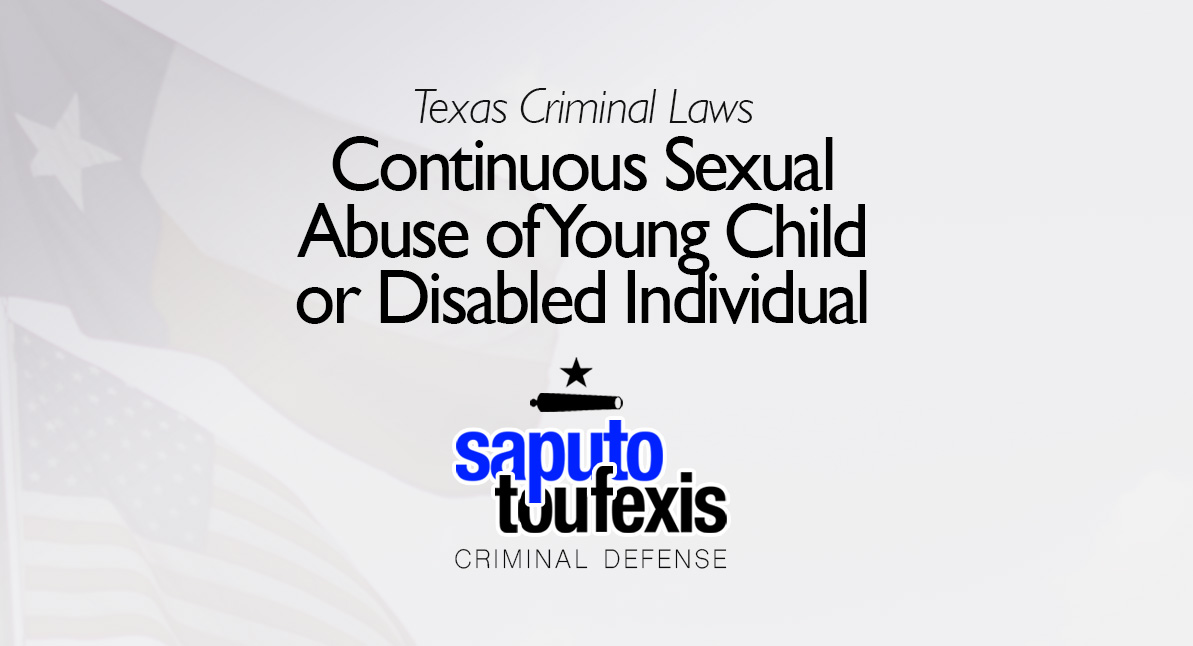The Texas Continuous Sexual Abuse law applies to cases where the prosecutors claim that a victim was younger than 14 years of age or “disabled.”
FAQs about the
Continuous Sexual Abuse of a Child or Disabled Individual law in Texas
- What is the current Texas law about Continuous Sexual Abuse of Young Child or Disabled Individual?
- What is the penalty for a Texas Continuous Sexual Abuse of a Child or Disabled Individual offense?
- What is “sexual abuse“?
- Who can be charged with Continuous Sexual Abuse?
- Who qualifies as a “child” under the law?
- What are the possible defenses available to an accused person?
- How long will I have to register as a sex offender if I am convicted of this offense?
- Who is considered a “disabled person” under the law?
- What is the statute of limitations for Continuous Sexual Abuse of a Child or Disabled Individual in Texas?
- Can you get probation for Continuous Sexual Abuse of a Child or Disabled Individual in Texas?
- Do I have to register as a sex offender in Texas if guilty of Continuous Sexual Abuse of a Child or Disabled Individual?
- What level of crime is Continuous Sexual Abuse of a Child or Disabled Individual in Texas?
In order for the law to apply, you must be at least 17 years old at the time of the offense. Also, the prosecutors must allege that you engaged in two or more sexual acts over a 30-day time period or longer. Because the offense requires a pattern of sexual abuse, it carries a higher punishment then any of the single sex crimes on which it is based.
Have you been charged with Continuous Sexual Abuse of Young Child or Disabled Individual? Contact us today to discuss legal representation.
or Text or Call (888) 239-9305
A charge of Continuous Sexual Abuse of a Child Under 14 ranks as one of the most severe offenses one can face, second only to Capital Murder. Pause and consider the gravity of that statement. Aside from capital murder, which may result in the death penalty, this is the harshest criminal charge in Texas.
This is a relatively new offense in the Texas Penal Code. The offense, originally called Continuous Sexual Abuse of Young Child or Children and now called Continuous Sexual Abuse of Young Child or Disabled Individual, was created as part of a set of laws called “Jessica’s Law,” in 2007 by the Texas Legislature. At the time, the Texas legislature was examining Texas criminal sex offenses in response to a nationwide call for tougher sex offender laws throughout the United States. Prior to 2007, there was no law that specifically punished a pattern of engaging in multiple child sex offenses.
The Texas legislature codified this criminal offense in Texas Penal Code Section 21.02. The law was not amended in 2025. The law was most recently amended in 2021 by expanding this law to include disabled individuals (in addition to children).
The Penal Code classifies the Texas Continuous Sexual Abuse of a Child or Disabled Individual law under Title 5 “Offenses Against the Person,” Chapter 21 “Sexual Offenses.” Learn more about the Texas offense of Continuous Sexual Abuse of Young Child or Disabled Individual below.
What is the current Texas law about Continuous Sexual Abuse of Young Child or Disabled Individual?
Legal References compiled by Saputo Toufexis | Criminal Defense PLLC:
^1. Texas Penal Code §21.02. This law is current as of 2025.FALSE










